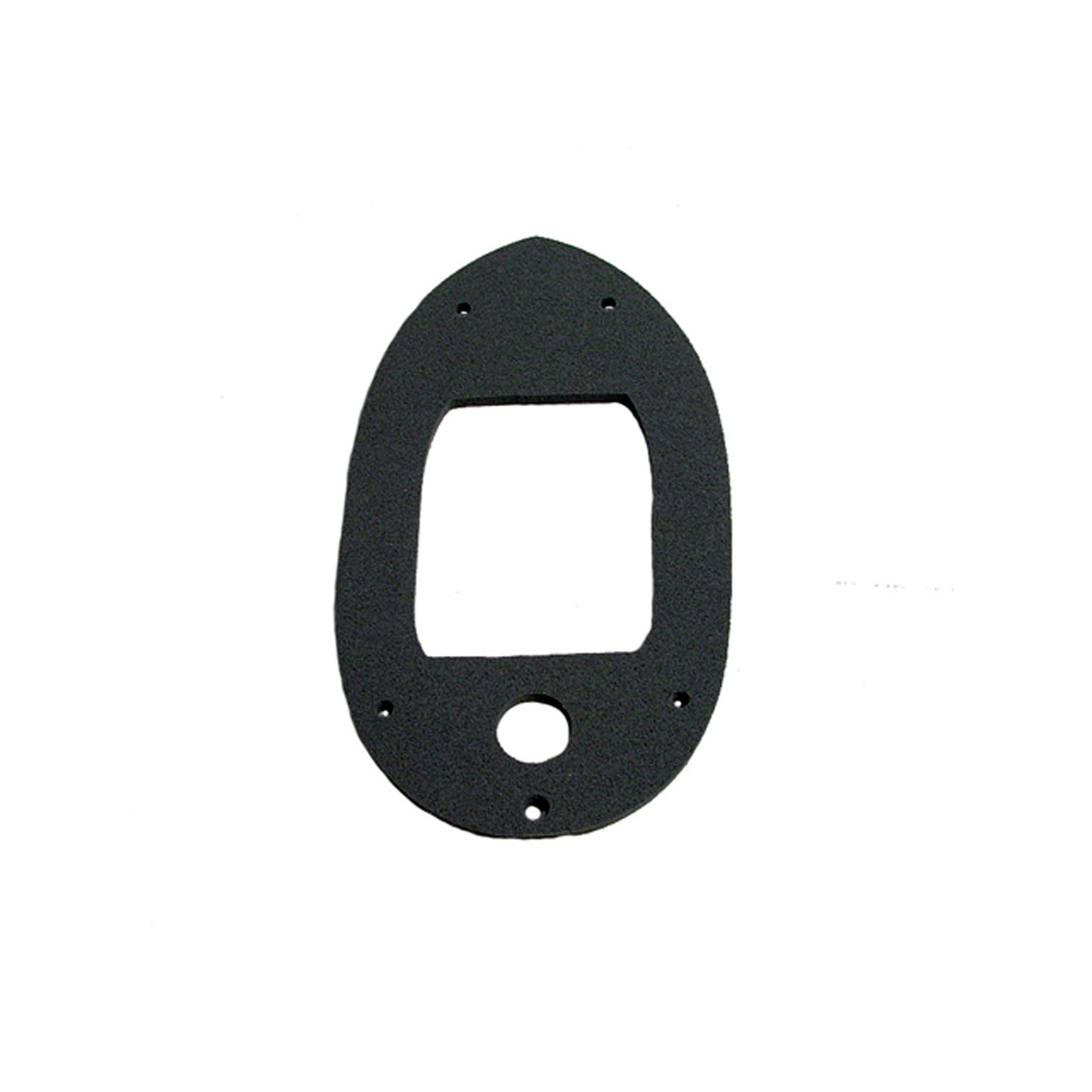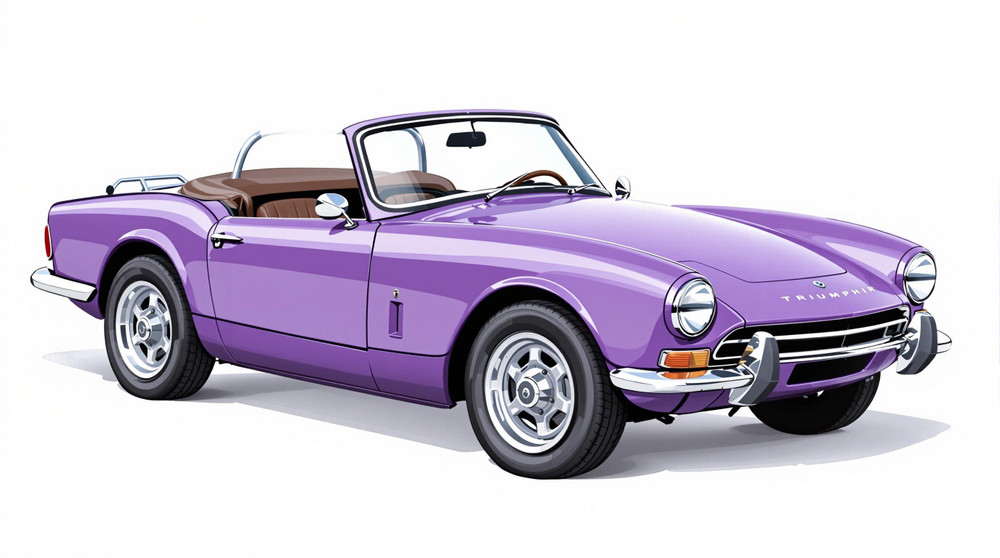Image of 1968 Triumph Spitfire, Note: These illustrations use artistic license and may differ from actual historical models.
Performance Metrics
Fundamental Metrics
Emotional Appeal
MMP Rating
| Engine Specifications | |
|---|---|
| Engine: | Inline 4 |
| Displacement: | 1.3L (1296 cc) |
| Horsepower: | 75 hp |
| Torque: | 72 lb-ft |
| Compression Ratio: | 9.0:1 |
| Ignition System: | Electronic |
| Cooling System: | Water-cooled |
| Performance Specifications | |
| 0-60 Time: | 13.4 seconds |
| 1/4 Mile Time: | 18.3 seconds |
| Top Speed: | 95 mph |
| Transmission and Drive | |
| Drive Type: | RWD (Rear Wheel Drive) |
| Transmission Type: | 4-speed manual |
| Fuel and Efficiency | |
| Fuel System Type: | Carburetor |
| MPG: | 32 mpg |
| Dimensions and Brakes | |
| Brakes: | Disc brakes front, drum rear |
| Wheelbase: | 83 inches |
| Weight: | 1,568 lbs |
Note: Specifications for classic cars are given to the best of our ability, considering the limited and variant data available.
1968 Triumph Spitfire: A Nimble British Icon
The 1968 Triumph Spitfire is not merely a car; it's a slice of motoring history that encapsulates the spirit of British automotive engineering. Born in an era of style and innovation, the Spitfire emerged from the stables of Triumph, a manufacturer known for its dedication to creating spirited and accessible sports cars. The '68 model, part of the Spitfire MK3 series introduced in 1967, boasted improvements over its predecessors and became a symbol of freedom and adventure during the swinging sixties. One unique fact that car enthusiasts might find fascinating is that the Spitfire was named after the famous World War II fighter plane, reflecting its agile and spirited performance.
Design and Innovation
The exterior of the 1968 Triumph Spitfire is a testament to timeless design. Its long bonnet, short rear deck, and swooping lines exude a sense of motion even when stationary. The interior, though compact, offered an intimate driving experience with seats trimmed in vinyl or optional leather, and a dashboard that was both functional and stylish for its time. Technologically, the Spitfire was ahead of many competitors with features such as independent rear suspension—a rarity in affordable sports cars then. Color options ranged from vibrant reds to deep blues, with Signal Red being a particularly popular choice. The roadster body style was iconic, often paired with an optional hardtop for versatility.
Historical Significance
The Triumph Spitfire's impact on automotive design was profound. It democratized sports car ownership, offering exhilarating performance at a price point that was within reach for many. Its design influenced a generation of roadsters that followed, setting standards for what a compact sports car should be—lightweight, nimble, and fun to drive.
Performance and Handling
Under the hood lay a lively 1.3-liter inline-four engine propelling the Spitfire to top speeds nearing 95 mph—a respectable figure at the time. Acceleration from 0-60 mph could be achieved in just over 17 seconds. Handling was one of the Spitfire's strong suits; its light weight and responsive steering made it a joy on winding roads while maintaining composure over bumps. Driving a '68 Spitfire was an auditory delight as well—the engine's throaty hum added to an immersive driving experience.
Ownership Experience
Owners of the '68 Triumph Spitfire used their cars for various purposes—from daily commuting to weekend racing endeavors. Its mechanical simplicity meant that maintenance could often be handled by the owners themselves, making it a beloved choice for amateur mechanics and classic car enthusiasts alike.
Fun Facts
The Triumph Spitfire has graced both small and big screens alike, adding to its celebrity status. A little-known fact is that despite its modest powerplant, it held numerous endurance records in its class during the late sixties. Criticisms were few but typically centered around limited cabin space and storage—a small price to pay for such character and performance.
Collector's Information
Today, the 1968 Triumph Spitfire is cherished by collectors worldwide. While production numbers were substantial—with tens of thousands built—finding one in pristine condition can be challenging. Values vary widely based on condition but generally range from $5,000 for a project car to upwards of $20,000 for concours-quality examples. The market has seen a steady appreciation for well-maintained models as they become rarer and more desirable among classic car aficionados.
Conclusion
The 1968 Triumph Spitfire remains an emblematic figure in the realm of classic British sports cars. Its blend of style, performance, and affordability has cemented its status as an enduring favorite among enthusiasts. Whether you're behind the wheel or admiring from afar, this quintessential roadster continues to capture hearts with its charm and driving pleasure.
1968 Triumph Spitfire Catalog of Parts
 1968 Triumph Spitfire Tail-light Lens Gasket. Each-MP 999-CCTail-light Lens Gasket. Each
1968 Triumph Spitfire Tail-light Lens Gasket. Each-MP 999-CCTail-light Lens Gasket. EachWhy Choose Metro?
For over 100 years, Metro Moulded Parts has been the pinnacle of quality in classic car restoration parts. Our commitment to precision and authenticity in every component ensures a perfect fit and an OEM-level appearance.
- Expert Craftsmanship & Quality: Each part is a testament to our dedication to reliability and perfection, crafted from original designs and thoroughly tested.
- Advanced Technology: We use cutting-edge techniques to create flawless, long-lasting parts that surpass others in performance.
- SuperSoft Sponge – The Ultimate Door Seal: Not only are our door seals 30% softer than competitors', but they're also guaranteed to never leak. They effectively reduce wind and road noise, enhancing your classic car's comfort and driving experience.
- Proudly American: Our parts are a product of American craftsmanship, made in the USA with a spirit of excellence and heritage.
- Unrivaled Warranty: We back our products with a 30-year industry-leading warranty, a testament to our confidence in their quality.
Join us in preserving the legacy of classic cars with parts that are crafted for perfection, not just made.

